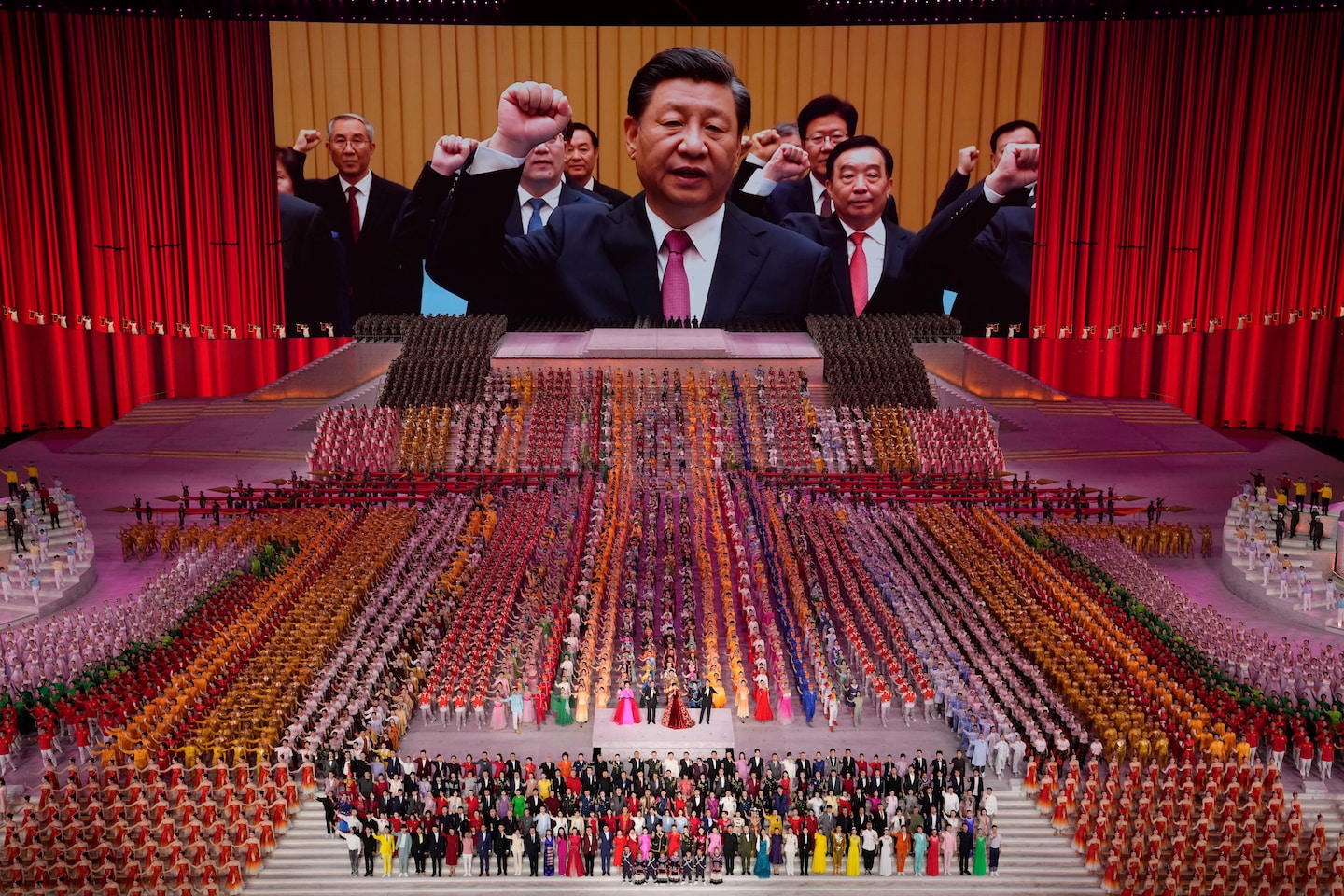Was Chinese Premier Li Keqiang challenging President Xi Jinping’s “zero covid” policy when he toured a university in southwestern China without a mask in May? Did Xi briefly disappear from the front page of the Chinese Communist Party’s official newspaper to quash a rebellion? Is Li making a last-ditch effort to usurp Xi?
Politics
Swirling doubts herald major shifts at upcoming Chinese political meeting – The Washington Post

Speculation about political infighting and schisms at the top of the Chinese Communist Party are a common feature of its secretive system of appointing new leaders. But this year, political silly season has started early, and the swirl of rumor has been especially intense.
That’s unsurprising in the buildup to the immensely important, twice-per-decade Party Congress in the fall, which is shaping up to be the most significant transition of power in China since the pro-democracy Tiananmen Square movement in 1989 sparked a messy inter-factional battle for control.
Most close observers of Chinese politics have brushed aside the idea of a fierce battle for power at the top of the party, arguing that Xi’s hold is so strong that he is near-guaranteed to take on a third term at this year’s meeting.
What is more unclear is whether the rumors flying around Chinese business circles and overseas Chinese-language media suggest a degree of pushback that will force Xi to compromise on personnel choices and water down some of his more ambitious policy objectives as he enters a third term.
“What is unusual this time is that China as a whole is doing poorly ahead of a historic Party Congress,” said Minxin Pei, a political scientist studying Chinese politics at Claremont McKenna College. “Its economy is in terrible shape; the zero-covid policy looks increasingly untenable; and China’s relations with nearly all Western countries are at historic lows. This of course does not reflect well on Xi.”
Chinese scholars, however, maintain that nothing is out of the ordinary. Victor Gao, a former interpreter for past leader Deng Xiaoping now at the Center for China and Globalization, a Beijing-based think tank, said in an interview that the rumors are merely part of the cycles of Chinese politics and will soon settle.
Gao did note that this year was particularly important because the transition will include significant turnover in the 25-member Politburo and the 200-odd Central Committee, where he expects new faces for about half of the former and at least a third in the latter. “You’re talking about changes, lots of changes. People retiring, lots of aspiring people trying to get up, being promoted,” he said.
To glean a sense of whether Xi’s rule is under serious pressure, international scholars carefully track promotions and demotions as well as signals in party propaganda. At the center of this informed guesswork — often called “tea leaf reading” — is the question of just how much Xi’s centralization of control has upended past competition and the delicate balancing of interests within the party.
After Xi’s decade-long campaigns to clear corruption and ensure loyalty, it’s unclear whether any cliques remain unified and influential enough to challenge his rule. But that doesn’t necessarily mean Xi is unopposed.
“It’s a huge political party, and at the end of the day, Xi Jinping cannot populate all the mid-level positions with trusted followers,” said Victor Shih, a scholar of Chinese politics at the University of California at San Diego.
In a recent book, Shih argues that autocratic political systems such as China’s create an incentive for strongman leaders to adopt a strategy of building “coalitions of the weak,” where politically compromised or inexperienced officials are favored for positions of power as a way of guarding the top leader from challengers.
This, Shih suggests, was the approach Mao Zedong took and Xi may be beginning to adopt. But doing so could mean promoting inexperienced officials incapable of tackling acute economic and foreign policy challenges. Xi faces a trade-off between choosing competent leaders who might later challenge him or taking a “safe route, which is what Mao did, to ultimately have a coalition of officials who are highly dependent on him.”
The exact processes of power brokering that China calls “intraparty democracy” remain shrouded in secrecy, but it is clear that Xi’s campaign to end infighting within the party has changed dynamics of internal contestation. Previous features of Chinese political maneuvering, such as an annual visit to the seaside town of Beidaihe, are less prominent, if they now exist at all.
Xi’s control of the formidable party discipline and ideology apparatuses mean any challenger faces a steep coordination problem to challenge his power. “Getting rid of him would be a very significant political earthquake for the party,” said Olivia Cheung, a research fellow at SOAS University of London. “No matter how many of the elite do not like Xi Jinping, there is a consensus that the party wants to stay on in power.”
Restricted information has made it harder for experts to predict major turning points in Xi’s tenure. Few predicted the monumental decision to end presidential term limits, announced by Xinhua News in a terse statement only a month before it was voted on at the annual meeting of China’s legislature in early 2018.
Policymaking, too, has become less transparent under Xi, who has made greater use of “central leading groups,” many of which he personally chairs, to centralize control of decision-making. On issues including the pandemic, cybersecurity and curbing debt in the property market, Xi’s policies have in the last year repeatedly caused market panic, but there have been few signs any of them will be reversed.
Such upsets are rarely blamed on Xi but, rather, on local officials. Shanghai’s botched lockdown, for example, has not led to a shift in China’s zero-covid policy, but some analysts believe it may hurt the promotion prospects of Li Qiang, the city’s party boss and a Xi ally.
Similarly, Li’s recent prominence, read by some as an indication of a challenge to Xi, can equally well be explained as the premier being intentionally used as a figurehead in charge of resolving deepening economic woes.
A small uptick in Li’s mentions in state media doesn’t mean he is “surging back into power,” said Neil Thomas, an analyst at the Eurasia Group, a think tank. “This is a way for Xi to make Li the face of economic policy in a year when economic policy is probably going to bring nothing but bad news.”
Mary Gallagher, a political scientist at the University of Michigan, said that Xi’s tenure has caused her to revise previous emphasis on China being unusual among authoritarian regimes, because before Xi, the party appeared to be moving toward institutionalization succession with top leaders bowing out after two terms.
“Having this expectation that every decade China’s leadership would change was really important in making China seem like a stable authoritarian regime,” she said. “Without those institutions in place, it not only makes investors nervous; it makes the next generation of leaders nervous.”
Politics
Youri Chassin quits CAQ to sit as Independent, second member to leave this month

Quebec legislature member Youri Chassin has announced he’s leaving the Coalition Avenir Québec government to sit as an Independent.
He announced the decision shortly after writing an open letter criticizing Premier François Legault’s government for abandoning its principles of smaller government.
In the letter published in Le Journal de Montréal and Le Journal de Québec, Chassin accused the party of falling back on what he called the old formula of throwing money at problems instead of looking to do things differently.
Chassin says public services are more fragile than ever, despite rising spending that pushed the province to a record $11-billion deficit projected in the last budget.
He is the second CAQ member to leave the party in a little more than one week, after economy and energy minister Pierre Fitzgibbon announced Sept. 4 he would leave because he lost motivation to do his job.
Chassin says he has no intention of joining another party and will instead sit as an Independent until the end of his term.
He has represented the Saint-Jérôme riding since the CAQ rose to power in 2018, but has not served in cabinet.
This report by The Canadian Press was first published Sept. 12, 2024.
The Canadian Press. All rights reserved.
Politics
‘I’m not going to listen to you’: Singh responds to Poilievre’s vote challenge

MONTREAL – NDP Leader Jagmeet Singh says he will not be taking advice from Pierre Poilievre after the Conservative leader challenged him to bring down government.
“I say directly to Pierre Poilievre: I’m not going to listen to you,” said Singh on Wednesday, accusing Poilievre of wanting to take away dental-care coverage from Canadians, among other things.
“I’m not going to listen to your advice. You want to destroy people’s lives, I want to build up a brighter future.”
Earlier in the day, Poilievre challenged Singh to commit to voting non-confidence in the government, saying his party will force a vote in the House of Commons “at the earliest possibly opportunity.”
“I’m asking Jagmeet Singh and the NDP to commit unequivocally before Monday’s byelections: will they vote non-confidence to bring down the costly coalition and trigger a carbon tax election, or will Jagmeet Singh sell out Canadians again?” Poilievre said.
“It’s put up or shut up time for the NDP.”
While Singh rejected the idea he would ever listen to Poilievre, he did not say how the NDP would vote on a non-confidence motion.
“I’ve said on any vote, we’re going to look at the vote and we’ll make our decision. I’m not going to say our decision ahead of time,” he said.
Singh’s top adviser said on Tuesday the NDP leader is not particularly eager to trigger an election, even as the Conservatives challenge him to do just that.
Anne McGrath, Singh’s principal secretary, says there will be more volatility in Parliament and the odds of an early election have risen.
“I don’t think he is anxious to launch one, or chomping at the bit to have one, but it can happen,” she said in an interview.
New Democrat MPs are in a second day of meetings in Montreal as they nail down a plan for how to navigate the minority Parliament this fall.
The caucus retreat comes one week after Singh announced the party has left the supply-and-confidence agreement with the governing Liberals.
It’s also taking place in the very city where New Democrats are hoping to pick up a seat on Monday, when voters go to the polls in Montreal’s LaSalle—Émard—Verdun. A second byelection is being held that day in the Winnipeg riding of Elmwood—Transcona, where the NDP is hoping to hold onto a seat the Conservatives are also vying for.
While New Democrats are seeking to distance themselves from the Liberals, they don’t appear ready to trigger a general election.
Singh signalled on Tuesday that he will have more to say Wednesday about the party’s strategy for the upcoming sitting.
He is hoping to convince Canadians that his party can defeat the federal Conservatives, who have been riding high in the polls over the last year.
Singh has attacked Poilievre as someone who would bring back Harper-style cuts to programs that Canadians rely on, including the national dental-care program that was part of the supply-and-confidence agreement.
The Canadian Press has asked Poilievre’s office whether the Conservative leader intends to keep the program in place, if he forms government after the next election.
With the return of Parliament just days away, the NDP is also keeping in mind how other parties will look to capitalize on the new makeup of the House of Commons.
The Bloc Québécois has already indicated that it’s written up a list of demands for the Liberals in exchange for support on votes.
The next federal election must take place by October 2025 at the latest.
This report by The Canadian Press was first published Sept. 11, 2024.
The Canadian Press. All rights reserved.
Politics
Social media comments blocked: Montreal mayor says she won’t accept vulgar slurs

Montreal Mayor Valérie Plante is defending her decision to turn off comments on her social media accounts — with an announcement on social media.
She posted screenshots to X this morning of vulgar names she’s been called on the platform, and says comments on her posts for months have been dominated by insults, to the point that she decided to block them.
Montreal’s Opposition leader and the Canadian Civil Liberties Association have criticized Plante for limiting freedom of expression by restricting comments on her X and Instagram accounts.
They say elected officials who use social media should be willing to hear from constituents on those platforms.
However, Plante says some people may believe there is a fundamental right to call someone offensive names and to normalize violence online, but she disagrees.
Her statement on X is closed to comments.
This report by The Canadian Press was first published Sept. 11, 2024.
The Canadian Press. All rights reserved.
-

 News14 hours ago
News14 hours agoB.C. to scrap consumer carbon tax if federal government drops legal requirement: Eby
-

 Sports15 hours ago
Sports15 hours agoLawyer says Chinese doping case handled ‘reasonably’ but calls WADA’s lack of action “curious”
-

 News14 hours ago
News14 hours agoA linebacker at West Virginia State is fatally shot on the eve of a game against his old school
-

 Sports9 hours ago
Sports9 hours agoCanada’s Marina Stakusic advances to quarterfinals at Guadalajara Open
-

 News14 hours ago
News14 hours agoHall of Famer Joe Schmidt, who helped Detroit Lions win 2 NFL titles, dies at 92
-

 News15 hours ago
News15 hours agoRCMP say 3 dead, suspects at large in targeted attack at home in Lloydminster, Sask.
-
News24 hours ago
Local Toronto business story – Events Industry : new national brand, Element Event Solutions
-

 News15 hours ago
News15 hours agoProvinces decry Ottawa’s plan to resettle asylum seekers across the country





























